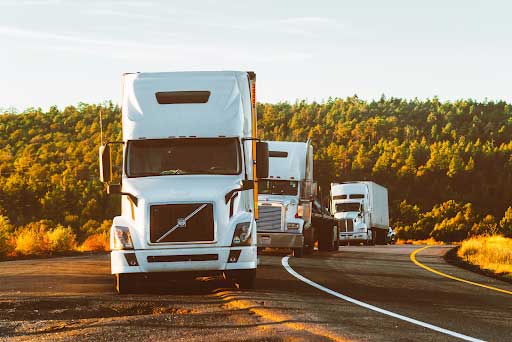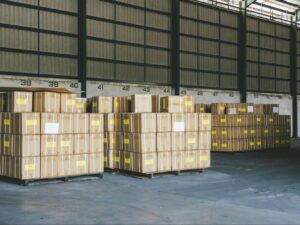What is meant by sustainable logistics? Below we provide more insight into this question, as logistics sustainability is one of the most interesting and important subjects we are facing at this time. Logistics involves every step that is taken between harvesting raw materials and a finished product or item in the hands of a customer.
One might wonder, what is the environmental impact of logistics and therefore the importance of sustainability in logistics. The impacts are considerable. Sustainable logistics is the effort of every entity along the supply chain to consider the environmental impact of their step along this process.
Sustainable logistics is ultimately a win-win for all parties. Not only will a negative impact on the environment be reduced, but sustainability also means improved efficiency and lower costs as a result of making the changes. As businesses along the supply chain begin to put their thought and effort into reducing the environmental impact of their process, the earth and the people get a win as well.
Public concern for the environmental impact of manufacturing, transport, warehousing, and so forth has been gaining ground. Companies have been joining the B Corporation movement, with approximately 4,000 seeking to “Be the Change” in the world. Living up to the B Corporation standards environmentally requires astute planning and continuous effort. Increasing numbers of businesses along the supply chain are making that effort or beginning that effort.
Sustainable Development
Sustainable logistics begins with the raw materials and how these materials are harvested and moved to the next step. This of course takes us one step back to the subject of sustainable development. Numerous raw materials are obtained in developing countries, including the food products found in our grocery stores.
Sustainable development includes the conservation of the ecosystem or environment, conservation of the biodiversity of the earth, and respect for the society and the people from which these raw materials or products are obtained. If businesses are committed to sustainability they will be respectful of the culture and the living conditions of the people who depend upon the well-being of the environment.
The barriers to logistics sustainability would be profit and growth prioritized over the environment and the people. A company cannot put profit above all and be a B Corporation. There has to be an investment of capital in new ways of designing and managing operations. Sustainable development practices help developing countries grow in ways that protect the environment and natural resources for future generations.
Consumers are increasingly concerned with the ethical means of providing raw materials, utilizing the environment, and protecting and improving the living conditions of the people.
Sustainable activities range from the supply of raw materials to the management of the lifecycle of products – which means from the beginning to the end use. The end use in sustainable supply chains involves the recycling, refurbishing, reusing, or ethical disposal of the product when its lifecycle is over.
As we can see, the concept of sustainable logistics is not limited to the environmental impact, it also involves economic and social responsibility along the supply chain.
Sustainable Manufacturing
Sustainable Logistics continues with sustainable manufacturing. A quick google search gives us this definition: “Sustainable manufacturing is the creation of manufactured products through economically-sound processes that minimize negative environmental impacts while conserving energy and natural resources.”
The benefit of committing to achieving sustainable manufacturing is, first of all, a good company reputation – a brand that is recognized by consumers to be responsible for its environmental impact, wise choices when it comes to transportation, use of an ethical Third Party Logistics company (3PL), using data collection and analysis to increase cost savings, and creating new partnerships.
A manufacturer will have many opportunities to reduce the environmental impact of their manufacturing process, storage, and use of resources. There are increasing numbers of B Corporations taking advantage of these opportunities. They are engaged in ethical manufacturing and experience the rewards of that decision.
The manufacturer works for sustainability through development, pre-production, production, postproduction, and distribution. During these stages, an ethical manufacturing company will find ways to:
- Reduce water usage
- Adjust and reduce energy loads in factories.
- Monitor air quality
- Utilize renewable resources
- Recycle and minimize waste.
- Find sustainable solutions for disposing of byproducts.
- Find sustainable packaging for shipment.
- Monitor energy savings in distribution.
Data collection and measurement to monitor efficiency is a means by which a business can save on its costs of manufacturing.
Sustainable Transportation

Transportation is a very important element of logistics and one that has a strong impact on the environment. Products travel from the source to the manufacturer, from the manufacturer via transport to the 3PL, from the 3PL via transport to the customer, and when returns are involved, back to the 3PL for re-use, repair, recycling, or disposal. Transportation is done by cargo ship, cargo plane, truck, rail, small truck, car, and even drone and bicycle in rare cases.
The google definition offered is, “Transportation in a supply chain refers to the movement of products from one location to another, which begins at the start of the supply chain as materials make their way to the warehouse and continue to the end user with the customer’s order delivered at the doorstep.”
Of course, our minds question how there can be sustainable transportation when almost all of the modes of transit involve fossil fuels. Sustainable logistics does involve a reduced carbon footprint when it comes to freight, logistics, and supply chain operations. How one gets to sustainable logistics operations varies, but there are several best practices to serve as a roadmap.
Millions of global citizens would love to see a more sustainable world when it comes to transportation. Several means of implementing sustainable transportation would be rebuilding mass transit, electrifying transportation, and investing in new technologies that reduce emissions.
The first step for companies along the supply chain is to identify where to implement changes. This is encouraged by the fact that identifying and making the shift to logistics sustainability will increase efficiency and eventually save money and time. The attempts of a company to minimize the environmental impact are known as green logistics, sustainable logistics, or eco-logistics.
A commitment to green logistics does offer benefits such as supply chain efficiency, cost savings, and an increasingly valuable reputation as a company dedicated to reducing environmental impact. And finally, logistics companies should consider the circular supply chain model when incorporating returns.
Sustainable Fulfillment
Sustainability in logistics is becoming more relevant in the transition from a linear economic model to a circular model of industrial economy which aims to improve the quality of raw materials and final products.
Sustainable fulfillment is the task of the fulfillment company (3PL) and like previous manufacturing and warehousing, there are many different areas in which the company can engage in sustainable practices. AMS Fulfillment is a B Corporation, and as such the company’s commitment to logistics sustainability is advanced and exemplary.
The following are some examples of our practices:
- Packaging & Purchasing – Only uses sustainable packaging materials and we purchase locally the most environmentally friendly options.
- Client packaging – Provides a catalog of sustainable packaging materials to its clients.
- Warehousing – Warehouse lighting is focused on allowing as much natural light as possible, eco-friendly lighting is used, and policies are in place to conserve energy and protect air quality.
- Equipment – Warehouse no longer uses gasoline-operated forklifts.
- Water & Landscaping – Provides employees with reusable water bottles, we conserve water in the interior spaces and our exterior grounds are designed for the proper flow of water.
- Paperless & Recycling – We do paperless order picking and all that can be recycled is being recycled in-house – the business and the employees take recycling to heart.
- Employee transportation – The company arranges for vanpooling and employees do take advantage of it.
- Returns/circular model – As previously mentioned, the company is focused on working with clients to handle returns sustainably.
- Education – Monthly Green Team meetings for continuous evaluation and improvements and new hire onboarding recycling training for all employees.
- Scope 1 and 2 Greenhouse Gas Emissions – We are in the process of monitoring, recording, and reporting, to set specific reduction targets focused on carbon emissions offsetting and carbon neutral certification.
As you can see, there are numerous opportunities within a 3PL for sustainable warehousing and fulfillment. There are additional opportunities to achieve sustainability in development, manufacturing, and transport logistics.

The environment, both natural and human, cannot thrive when profit is placed above all other responsibilities. We respect and appreciate every business that seeks to “Be the Change” and we also understand that the citizens of the earth and the consumers of our products and services have called upon us to do so.
Hopefully, this article has, at least in part, answered the question: How do you achieve logistics sustainability? The answer is… put your mind to it. It’s an opportunity and a challenge, with benefits for all.




